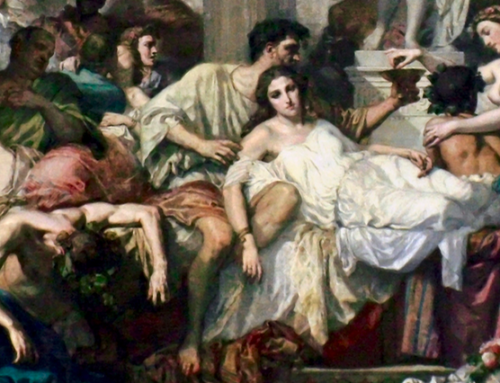A group of top economists, among them any number of Nobel laureates, signed a letter endorsing Republican presidential candidate Mitt Romney’s economic plan. These economists indicated that as president, Romney would do six salutary things.
Romney would reduce taxes, control spending, limit and improve regulation, make social security and Medicare sustainable, reform healthcare according to a market model, and devise sensible energy policy.
All very good stuff. After these past three years of quite the opposite, as we’ve suffered with 13 million unemployed, we need all of these things.
But one big thing is missing. Where is the plank on monetary reform?
Ever since the Federal Reserve started its money-printing exercises when the Great Recession hit (indeed even before, as the Fed stoked the housing bubble), the public has been onto the fact that something is wrong with this nation’s monetary order. Hence the Rep. Ron Paul (and Herman Cain) presidential candidacy last year, the big sales of Rep. Paul’s book End the Fed, and the run-ups in commodity prices typified by gold at $1600 an ounce.
It’s been pretty clear to people in general this past half decade that the Fed has acted inappropriately as we have endured the preamble to the economic crisis as well as the thing itself. It would appear that to the public at large, no program to rescue our economy from its terrible funk could possibly be credible unless it gives primacy of place to monetary concerns.
Yet we got no mention of this from Romney’s 400 experts. The funny thing about this is that over the last thirty years—ever since Ronald Reagan—we have achieved virtually everything on the economists-for-Romney list. We have gotten major tax reduction several times over the last three decades; a nice reduction in spending (in the 1990s); a slowdown of regulations (under Reagan); a bipartisan commission reform of social security (in 1983); and substantial decontrol of energy markets (in the 1980s and the 2000s). Everything on the list, with the exception of health-care reform (and even here there were health savings accounts), has in fact been ingrained in policy in substantial fashion in recent memory.
And yet bam—we got this mothering economic crisis of 2008-2012, the one with no end in sight, anyway.
Experts have been slow to criticize the Fed throughout this experience. A gap has thus emerged between titled opinion and that of the public as to what lies at the center of our straightened economic circumstances.
Why this is so is not entirely clear. One reason, surely, is the fact that Fed-bashing has taken on a hearty populist hue. This means that the paladins of economics will by nature strive to differentiate themselves from the mob and excuse the Fed.
This is a worrisome tendency in economics, on two counts. The first is that the vox populi is probably onto something. Why should the profession risk being wrong on such an important issue?
There is perhaps no institution in our government that has been so cornered by economists as the Fed. The Fed is the place most dominated by the credentialed Ph.D.’s of the profession. It would rankle economists to concede that despite this capture of the Fed by their ranks, the Fed was at fault for causing the worst economic crisis in eons. It would implicate the profession in the whole mess.
The other problem, more prosaic, concerns the Romney campaign. The public (which is to say the electorate) largely thinks that the Fed has blood on its hands in this crisis, and that it needs to be reformed if not attenuated in order for real recovery to come. Naturally, a campaign interested in getting votes should seek to appeal to the public on these grounds. Yet the 400 economists shied away from the matter entirely.
When Ronald Reagan was running for office in 1980, the Fed was behaving badly, if in a very obvious way in that the yearly inflation rate was 13%. One of Reagan’s explicit economic planks was for reform of monetary policy. Reagan even had a task force of economists devoted to the matter. Reagan didn’t hide from the issue of monetary policy and the Fed, and he won in a landslide.
As it turned out, no real reform of the Fed ensued. After the Fed roughly gave Reagan, and then Clinton, the monetary policy these presidents desired, it lapsed into the bad habits that are congenital to it in the 2000s. If we think this nation can get back to growth, opportunity, and prosperity without reform of our monetary institutions, we’ve been swayed by the experts instead of the great wave of democratic opinion.
Books on the topic discussed in this essay may be found in The Imaginative Conservative Bookstore. Originally published at Forbes.com the essay is reprinted here with gracious permission of Brian Domitrovic.








The need for monetary reform will not become center stage until the insanity of quantitative easing is revealed to the American public. The 2.7 trillion dollars printed by the Fed to buy back our own government bonds is a shell game of enormous proportions. This will become apparent after inflation comes rolling in. Let's just hope that if Romney gets elected he shows Mr. Bernake to the door.
You have to wonder, as I do, about the morality of a generation that proclaims "god" and "American values", while burying their children in debt that they did not benefit from, but will be a lifelong slave to.
Scott,
If Americans are willing to murder more than a third of their children in the womb, what's the big deal about burdening those which survive with debt? After all, one of the main points of contraception and abortion is so that people can "enjoy life" which by the modern American definition includes going into debt to buy lots of stuff.